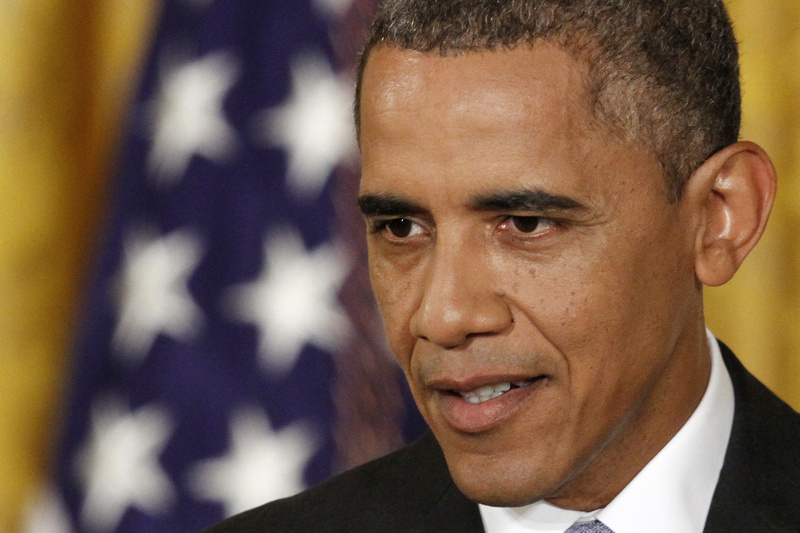WASHINGTON — President Barack Obama unveiled a series of proposals Friday that could curtail the federal government’s ability to spy on Americans in light of eroding confidence by the public following recent leaks about the massive surveillance programs.
Obama announced at a White House news conference that in an effort to provide greater oversight and transparency, he will urge changes to the Patriot Act, which bolstered law enforcement’s ability to gather intelligence in the United States following the Sept. 11, 2001, terrorist attacks, and the secret court that approves government surveillance programs.
But the president will need to convince a divided – and often dysfunctional – Congress to make the most significant modifications. On Capitol Hill, some lawmakers from both parties have supported the programs for years, while others said they were never informed of the scope of the collection and want changes.
Obama’s decision marks a stunning turnaround for a president who has repeatedly downplayed the scope of the programs since newspapers revealed in early June that the National Security Agency is collecting telephone records of tens of millions of Verizon customers, as well as emails through nine companies, including tech giants Microsoft, Yahoo, Google and Facebook.
He described the uproar over the programs as “hype” and repeatedly said he was not “Big Brother.”
In anticipation of his announcement, senior administration officials who were not authorized to speak publicly said that the president wants to protect Americans, but understands that he needs to provide the appropriate safeguards and oversight to guard against abuse.
Obama has spent weeks meeting with people behind closed doors as he developed his proposal. Just this week, he held sessions with technology industry lobbyists, civil liberties advocates, and the CEOS of major technology companies, including Apple and AT&T.
His administration, which has already taken the unprecedented step of disclosing a number of documents related to the surveillance programs, will declassify a series of others about the NSA’s purpose and the government’s rationale for conducting surveillance.
He will also appoint a full-time civil liberties and privacy officer, create a website to release documents in the future and appoint a task force of outside experts to review the programs. The task force will provide recommendations to Obama in 60 days and then again at the end of the year.
Lawmakers from both parties have proposed legislation in recent weeks that would limit the scope of data collections. The measure would also require a constitutional advocate to be appointed to the secret court to serve as an adversarial point of view when the government requests permission for intelligence programs, and add more public disclosures by the NSA.
Obama supports some of those changes, including having an adversary, but support on Capitol Hill on issues related to the NSA scandal has not fallen strictly along the party lines where so many other politically controversial concerns break down.
One congressional proposal would have severely limited the scope of the information that could be collected, and directly tied NSA’s compliance to its receipt of federal dollars. But the measure fell short by only 12 votes, a narrower margin than expected.
Obama had been initially skeptical about surveillance programs as a presidential candidate. As a senator, he supported changes to the Patriot Act that would have required the government to convince a judge that the records they are seeking have some connection to a suspected terrorist or spy.
He said he changed his mind after his staff evaluated them and expanded some of the safeguards. As president, he signed off on the programs, continuing many of the ones his Republican predecessor, George W. Bush, began after the Sept. 11, 2001, terrorist attacks and engaged in an unprecedented crackdown on classified national security leaks.
Some of the programs are allowed under Section 215 of the Patriot Act, which authorizes the government to ask a court for documents that would assist in an investigation to protect against international terrorism or clandestine intelligence activities.
The orders are signed off by a secret court that oversees domestic surveillance, the Foreign Intelligence Surveillance Court, established by Congress in 1978.
Some of the proposed changes are meant to offset what until now has been a one-sided process. Last year, for instance, the court reported receiving 1,789 government applications for electronic surveillance. One was withdrawn and all the others were approved, according to the court’s annual report.
Separately, the government last year made 212 applications to the secret court for access to “certain business records.” All of these applications, too, were approved, though many with court-ordered modifications.
All told, the intelligence court has received 6,288 completed surveillance applications from the government since Obama took office. All have been approved.
The Foreign Intelligence Surveillance Court has 11 members. All are federal judges are taken from other courts, appointed by the chief justice of the Supreme Court. Currently, all of the judges were appointed by Chief Justice John Roberts.
Send questions/comments to the editors.




Success. Please wait for the page to reload. If the page does not reload within 5 seconds, please refresh the page.
Enter your email and password to access comments.
Hi, to comment on stories you must . This profile is in addition to your subscription and website login.
Already have a commenting profile? .
Invalid username/password.
Please check your email to confirm and complete your registration.
Only subscribers are eligible to post comments. Please subscribe or login first for digital access. Here’s why.
Use the form below to reset your password. When you've submitted your account email, we will send an email with a reset code.